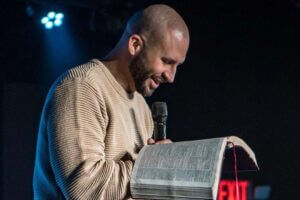Here is an example of The Sinner’s Prayer:
“Dear God, I know I’m a sinner. I know my sin deserves to be punished. I believe Christ died for me and rose from you grave. I trust Jesus alone as my Savior. Thank you for the forgiveness and everlasting life I now have. In Jesus’ name, amen.”
I can remember early in my ministry looking for The Sinner’s Prayer in Scripture, and when I couldn’t find it, I was shocked. I can also remember being terrified early in my ministry that I would say “The Sinner’s Prayer” wrong when I attempted to point sinners to Christ; for, if I recited it wrong, regardless if my hearers prayed the prayer or not, they would still be lost!
This mentality is wicked, for it adds to the gospel of Christ. By believing that sinners cannot be saved without “The Sinner’s Prayer” (see above), we communicate that “The Sinner’s Prayer” is essential for salvation, even though the Bible knows no such reality. In his dissertation on the subject, Paul Chitwood-executive director of the Kentucky Baptist Convention-warns us of emphasizing The Sinner’s Prayer:
“This ethical consideration for evangelism applies to usage of the Sinner’s Prayer in much the same manner as the first. When a prayer is the supreme goal of a witnessing encounter and based upon that prayer we determine our success or failure in leading lost souls to conversion, we run the risk of allowing that prayer to become a stumbling block.
On the one hand, we may as [Jim] Elliff charges, bring people to ‘believe in the efficacy of a prayer and not the efficacy of Christ’s work.’ When we do so, the prayer becomes a stumbling block to that person’s salvation, the chief stumbling block indeed. On the other hand, we may communicate to people who have not prayed the prayer that they are lost and without praying the prayer they cannot be saved. I refer back to the incident recounted by George Martin in which a pastor had a young boy repeat the prayer again to be certain he had done it correctly so the church family could, in good conscience, acknowledge the boy’s salvation.
We also recall Leonard’s comments, ‘At the slightest doubt, simply pray the prayer again and settle it. Lots of people repudiated earlier events—childhood professions dimmed by age, aisle walking without understanding, praying the prayer without meaning it, or praying the wrong prayer.’ It may very well be that we have indeed ‘enthroned’ the Sinner’s Prayer to the point that it has become a stumbling block instead of a stepping-stone as a method in evangelism (pg. 122-123).
When pastors, evangelists, church leaders, etc. make The Sinner’s Prayer necessary for salvation, they add to the gospel, and thus make it twice as hard for someone to truly trust in Christ (It is no different than making baptism necessary for salvation. At least baptism is in Scripture).
In other words, in trying to simplify the gospel, we’ve actually added to the gospel, possibly eliminating the gospel in the process. For, if our hearer(s) trust in the prayer instead of in Christ, they are doomed for Hell while possessing assurance (false) of their salvation. I fear there will be millions of sinners in Hell who prayed The Sinners Prayer, millions in hell who were declared saved by church leaders-yet, not by Christ-because they prayed The Sinner’s Prayer. But there will be none in hell who repented of their sin and placed their faith in Christ.
Christ will raise up those who repent and trust in Him on the last day, but He has not promised to raise up everyone who prays “The Sinner’s Prayer” (John 6:35-40). Instead of emphasizing “The Sinner’s Prayer,” let us emphasize repentance of sin and faith in Jesus Christ, who died for our sins and rose from the dead to declare us righteous and bring us into right relationship with God (Rom. 4:24-25).
May we emphasize what actually saves: God’s grace alone through faith alone in Christ alone.
May we use prayer as a possible expression of this repentance and faith, telling our hearers that God saves through repentance and faith in Christ, instead of saying that God saves through The Sinner’s Prayer.
May we trust God to assure His people of their salvation instead of declaring righteous those who say The Sinner’s Prayer.
Jared Moore is pastor of New Salem Baptist Church in Hustonville, Ky. He is the author of 10 Sacred Cows in Christianity That Need to Be Tipped. You can read his blog at jaredmoore.exaltchrist.com.
For the original article, visit jaredmoore.exaltchrist.com.
See an error in this article?
To contact us or to submit an article




















